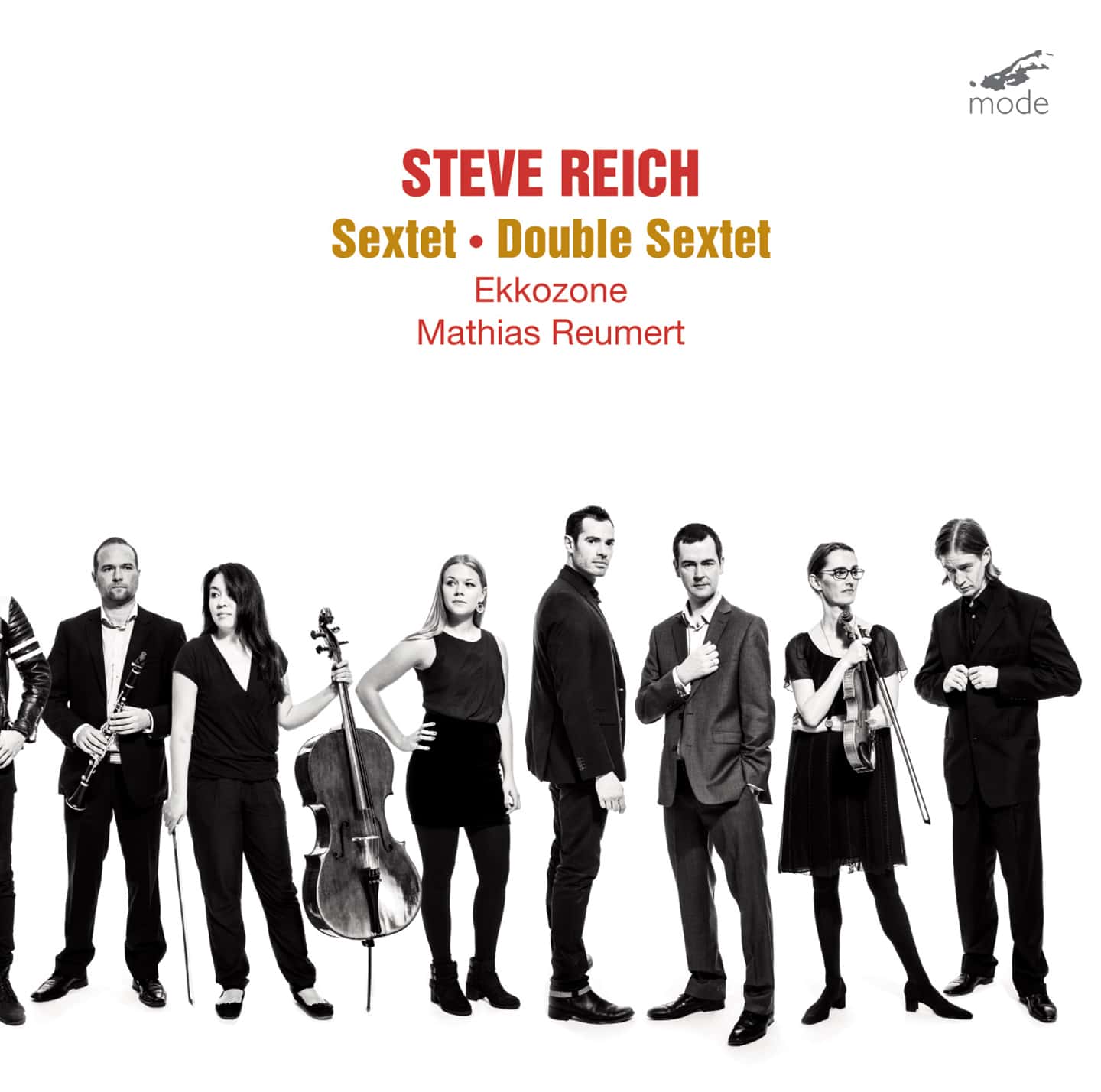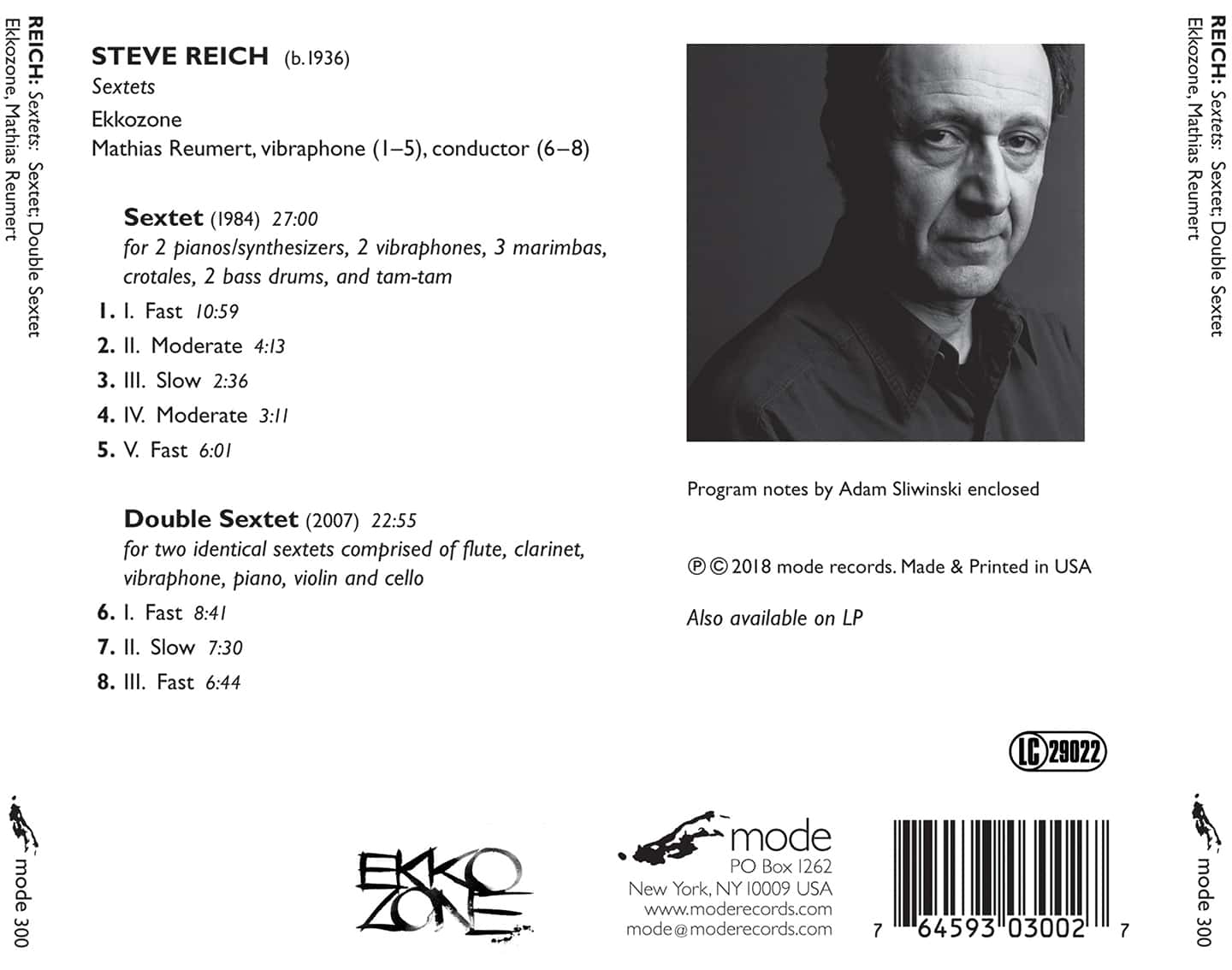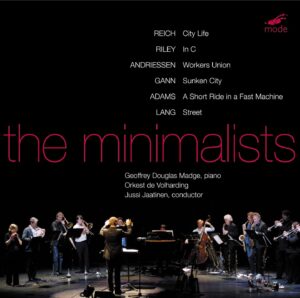Sextets - LP
Ekkozone
Mathias Reumert, conductor & percussion
Sextet (1984) 27:00
for 2 pianos/synthesizers, 2 vibraphones, 3 marimbas, crotales, 2 bass drums, and tam-tam
Double Sextet (2007) 22:55
for two identical sextets comprised of flute, clarinet, vibraphone, piano, violin and cello
mode 300 (CD or limited edition LP)
This release couples two of Reich’s “sextets” for the first time: the Sextet of 1984 and the Pulitzer Prize winning Double Sextet of 2007, which also makes its first appearance on LP.
A striking difference between the two pieces is that the rhythmic world of Sextet mostly consists of a single-meter grooving, while Double Sextet works in the angular, off-kilter shifting meters reminiscent of Reich’s Tehillim (also of Stravinsky).
Ekkozone impart a uniquely chamber music feel and color to these works while maintaining their propulsive character.
Liner notes by Adam Sliwinski.
LP lacquers and mastering by veteran Scott Hull at Masterdisk. Plated and pressed by RTI, California.
Reviews
Steve REICH “SEXTETS” wins the prestigious DIAPASON D’OR!
English translation highlights:
“Let’s salute Daniel Storm’s excellent mixing: each instrument, defined by exact location in the stereo image, becomes a sound object. The resulting relief … is sculptural.
… Ekkozone creates a transcendent “mechanical” collective, causing euphoria … A record better than highly recommendable: unavoidable.”
Saluons l’excellence du mixage réalisé par Daniel Storm : chaque instrument, extrait du contexte acoustique du lieu d’enregistrement, devient un objet sonore. Le relief résultant, constitué de plans sonores indépendants, s’affirme sculptural.
Même si elle est aujourd’hui largement jouée, l’oeuvre de Steve Reich reste une affaire d’initiés soigneusement prepares. C’est qu’on ne s’aventure pas comme ça dans une musique où le moindre fléchissement du tempo, la moindre bavure rythmique, la moindre chute de tension menacent d’abîmer l’ensemble. Les virtuoses du collectif danois Ekkozone ont indubitablement integré cette virtuosité spécifique, abordant ces deux sextuors avec une formidable réactivité et un infime groove, qui preserve la pulsation obstinée et les rythmes exacts de tout monotonie.
Dès la première des cinq sections du Sextet (1984), on perçoit une énergie concentrée mais ductile et très vivante. Souple lui aussi, le toucher des interprètes garantit un son de marimba jamais sec, Les effets polyrythmiques, en partie inspirés des polyphonies centrafricaines, sont parfaitement lisibles, sans qu’un ping-pong latéral se fasse trop envahissant.
Les disques nous a déjà offert de belles versions du sextuor : la prise de son n’est pas un détail s’il faut les hiérarchiser. Les percussionnistes du LSO (2015, cf. n° 654) ne manquent pas d’entrain, mais sont disqualifiés par un son distant don’t le sfumato dessert les musiciens. On avant beaucoup aimé Third Coast (Cedille, cf. n° 645) don’t le côté pop (capitation proximité, basses plus présentes, son plus rond, forte latéralisation), paraît plus évident et séduisant. On peut toutefois préférer les nouveaux venus, qui ont pour eux davantage de réalisme acoustique. Autre atout pour Ekkozone, une propulsion sans faille dans le dernière section, où les Américaines de Third Coast tendent légèrement à presser simultanément le frein et l’accélérateur.
Avec Double Sextet (2007), deux sextours identiques (flûte, clarinette, vibraphone, piano, violin et violoncelle) provoquent une subtile tectonique des plaques rythmiques. Le groupe Eighth Blackbird, commanditaire de l’oeuvre, avait gravé pour Nonesuch (2009) une version qui faisait référence. Là encore, le présent disque vient bousculer les certitudes. Et sa stéréo moins large mais plus profonde nous laisse davantage d’air pour respire (à moins de préférer l’effet psychédélique et pop du déphasage gauche/droite qui ne manqué certes pas de charme). Même l’excellent Signal Ensemble de Brad Lubman, en dépit de sa force motrice, pâtit d’un son global assez compact (HM, 2011). Ekkozone s’impose par une transcendante « mécanique » collective, et provoque l’euphorie avec tout le confort moderne. Un disque mieux que très recommendable : incontournable.
— Pierre Rigaudière, Diapason, September 2019
“…the virtuosity of Ekkozone, which breathes with vigorous and flexible pulsation, accompanying everything with a welcome zest of lyricism. Let’s add the breathtaking quality of the recorded sound, with great clarity and depth, and we have a dizzying album.”
Les amateurs de l’art du déphasage et de la polyrythmique trouveront ici, dans le premier volet de ce disque déjà indispensable, les liens qui unissent « Drumming » (1970-1971), oeuvre constitutive dans le repertoire de Steve Reich, et « Sextet » (1984). Une meme pulsion, à forte influence africaine, se dessine en filigrane. Puis, avec le double sextet, le discours s’étoffe sur le front instrumental et laisse entendre toute la rischesse et la virtuosité d’Ekkozone, qui insuffle une pulsation vigoureuse et souple, accompagnant le tout d’un zeste de lyrisme bien venu aux archets. Ajoutons encore la qualité époustouflante de la prise sonore, d’une grand clarté et profondeur, et on tient un album vertigineux.
— R.Z. Tribune de Geneve, 14-15 September 2019
The Canteloupe (NOTE: wrong label attribution, Gramophone!) label also supplies an illuminating insert with its new album of Reich by the Danish Ekkozone ensemble. Like the string works of Bach, minimalism seems particularly suited to the new LP market — provided the surfaces are absolutely silent, which they are in these riveting accounts of the Sextet and Double Sextet. Once upon a time, these pieces were apparently impervious to interpretation, and the composer-led DG recording of the Sextet required no rival. But recording balance makes all the difference: Ekkozone are much more closely miked than the recent LSO Live performance (9/16, also released on vinyl), and spread across a wider stereo spectrum. The accumulating menace and cathartic release of the Sextet is captured with exceptional fidelity; by contrast the Double Sextet is infused with a more generic exuberance, but the fastidious separation of the instrumental layers here scores over the 2016 recording on Harmonia Mundi (also 9/16).
— Peter Quantrill, Gramophone, August 2019
“Ekkozone’s recordings of both works on this CD are second to none, and should be placed on your wish list forthwith.”
There is more than one way to skin a cat, and there is always more than one way to perform good music. Steve Reich’s Sextet is a long way past being ‘minimalist’, even though there are ostinato elements that recall that particular phase in Western music’s evolution. The first movement and other sections recall Reich’s The Desert Music, while the groovy low piano notes in the final Fast section have something of the finale of New York Counterpoint about them. Multi-layered percussion makes all of this a feast for the ear, and Ekkozone and their hyper-reality studio recording play the piece with a swing and uplifting sense of fun that is very infectious indeed. The bass drums on the second Moderate section are played with musical subtlety but have been balanced in such a way that you’ll enjoy seeing your woofers moving about at reasonable volume. Stereo spread is also a good feature of this recording for all but the piano sound, which is kept very much to the centre channel.
There are numerous recordings of Sextet around. Third Coast Percussion (review) is good, with marginally more measured tempi than Ekkozone and a close-miked balance that reveals superb playing while at the same time being less fun and involving. Steve Reich and Musicians on the Nonesuch label is a classic of course, but uses a rather heavy sounding organ in the opening – this first movement being a little faster than Ekkozone while the remaining movements are as close in timing as makes no difference. The LSO Percussion Ensemble is ok (review), but in this case is too light on the sustained organ notes in the first movement, and there are a couple of moments of imprecision in the ensemble playing elsewhere that dampened my enthusiasm somewhat – understandable for a live performance, but less desirable in repeated listening. Go back to the impact of Ekkozone’s opening after living the LSO for a while and you’ll be hooked straight away.
Double Sextet is also a fine piece, though to my ears not quite the masterpiece that is Sextet. Ekkozone put plenty of dramatic urgency into the first of its three movements, and once again the recording is full of detail and presence. The slow middle movement is soulfully melancholic and atmospheric – a cinematic scene of nocturnal regret, while the finale is even more of a bustling city street than the first.
I greatly enjoyed Ensemble Signal’s recording of the Double Sextet on the Harmonia Mundi label (review). The timings are a little shorter on this version, though not by enough to change the character of the music by a great deal. Ekkozone’s Slow movement has more emotional impact to my ears, their instruments more natural sounding in general, and the vibrato in the string sound adds an extra few ounces of heartstring tug to the cooler sound of Ensemble Signal.
All of these comparative notes are very marginal, and I haven’t come across any recordings of either of these works that are complete duds. As Adam Sliwinski writes in the booklet note for this release, Steve Reich’s music is “like a native language” to percussionists these days, and the chances are that if you walk down the corridor of any decently sized music academy’s percussion department you will hear one or other of his pieces being perfected. Ekkozone’s recordings of both works on this CD are second to none, and should be placed on your wish list forthwith.
— Dominy Clements, Musicweb-International, January 2019
http://www.musicweb-international.com/…/Reich_sextet_MODCD3…
STEVE REICH’s “SEXTETS” performed by EKKOZONE reviewed by Tom McKinney on BBC RADIO 3!
“…executed with real precision yet never feels metronomic or robotic, having a definite groove that propels it forward…”
Listen to the entire review including an excerpt of the “Double Sextet” at:
https://www.bbc.co.uk/radio/play/m0000d1k
the review is between ca.1:48:00 – 1:58:00




